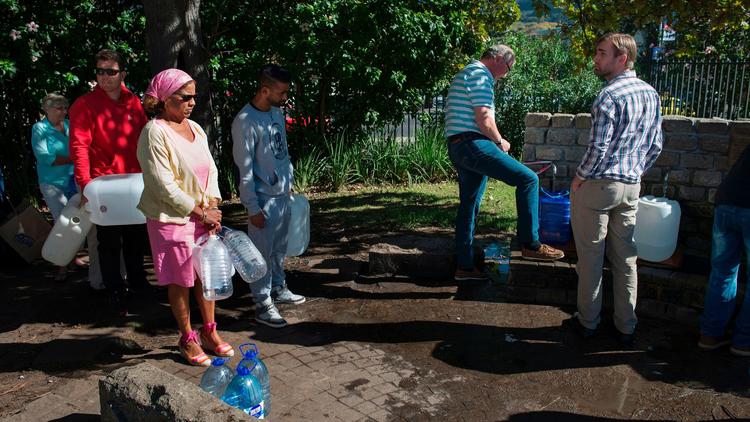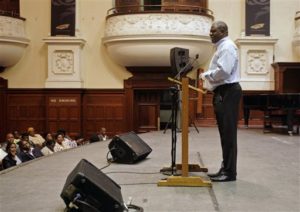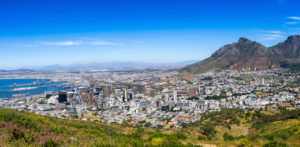Cape Town Could Run Out of Water in 90 Days
Amid a record drought, South Africa's second-largest city could become the first major city in a developed country to lose its water supply. People line up to collect drinking water from spring-fed taps last year in Cape Town, South Africa. The region is battling its worst water shortages in 113 years. (Rodger Bosch / Getty Images)
People line up to collect drinking water from spring-fed taps last year in Cape Town, South Africa. The region is battling its worst water shortages in 113 years. (Rodger Bosch / Getty Images)
Cape Town, South Africa’s second-largest city, could run out of water by April as the city faces its worst drought in a century. The city’s mayoral committee member for water, Xanthea Limberg, said the city is likely to reach Day Zero, the day when the water supply is expected to run dry, on April 22.
The Los Angeles Times reports:
In this city of 4 million, people will have to line up in the streets at just 200 water stations. The police and army will enforce a limit of 6.6 gallons per person and adopt measures to control crowds. Some experts believe evacuations will be necessary.
If the city runs out of water, it will be the first major city in a developed country to do so.
But a number of details of the crisis plan remain unclear. How would one person carry 26 gallons of water for a family of four? How would the elderly and disabled cope? What about the fact that officials expect there will be insufficient water to flush the city’s toilets?
Households will be expected to contribute to water conservation efforts. USA Today reports that beginning in February, Cape Town residents and visitors will be allowed to use 13 gallons of water each day (the average American uses 88 gallons of water per day, according to the Environmental Protection Agency). Water use beyond this allotment will result in residents being charged three times the current rate, and they must agree to have water restriction devices installed in their homes.
But these efforts may not be enough. The Times adds:
Until recently, the city rejected the idea of a desalination plant as too costly, but it now has a slew of new water projects, including desalination plants, recycled water plants (which purify reclaimed water) and new efforts to tap groundwater. But all but one of these efforts are behind schedule, and experts fear they will not avert the arrival of Day Zero.
“That was the mistake of Cape Town, ignoring those early warnings and relying only on water conservation and water demand management,” [public policy analyst Maggie] Bourblanc said. “It was based on normal rainfall conditions, and in South Africa, you can never rely on that. There was no other plan to quickly augment the water supply.”
Anthony Turton, a water expert at South Africa’s University of the Free State, told the Times that ordinary citizens are “reaching the breaking point” of the water use caps. “You have people saying, ‘Enough,’ and ‘No further,’ ” he said.
Mayor Patricia de Lille, however, believes the responsibility still lies with Cape Town residents. “We have reached the point of no return,” she said in a news conference Thursday. “Despite our urging for months‚ 60 percent of residents are callously using more than the 23 gallons per day [currently allotted]. It is quite unbelievable that the majority of people do not seem to care and are sending all of us headlong toward Day Zero. At this point we must assume that they will not change their behavior.”
CBS News reports that Cape Town officials believe that if residents dramatically cut back on personal water use, they can avoid having the water supply run dry until the rainy season begins in May.
However, University of Cape Town climate scientist Peter Johnston warned that even with bountiful rainfall, the water crisis will not be over because of the region’s rising temperatures.
“That increase in temperature is going to increase evaporation. Increased evaporation is going to mean that there is less water that’s available for our use,” he told CBS News.
Your support matters…Independent journalism is under threat and overshadowed by heavily funded mainstream media.
You can help level the playing field. Become a member.
Your tax-deductible contribution keeps us digging beneath the headlines to give you thought-provoking, investigative reporting and analysis that unearths what's really happening- without compromise.
Give today to support our courageous, independent journalists.




You need to be a supporter to comment.
There are currently no responses to this article.
Be the first to respond.